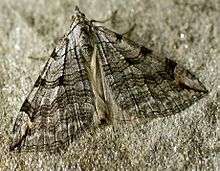Treble-bar
The treble-bar or St. John's wort inchworm (Aplocera plagiata) is a moth of the family Geometridae. the species was first described by Carl Linnaeus in his 1758 10th edition of Systema Naturae. It is found throughout the Palearctic region and the Near East.
| Treble-bar | |
|---|---|
 | |
| Scientific classification | |
| Kingdom: | Animalia |
| Phylum: | Arthropoda |
| Class: | Insecta |
| Order: | Lepidoptera |
| Family: | Geometridae |
| Genus: | Aplocera |
| Species: | A. plagiata |
| Binomial name | |
| Aplocera plagiata | |
This species varies considerably in size (wingspan 37–43 mm) and colouration but is generally grey with three characteristic dark fascia across each forewing, giving it its common name. The hindwings are pale grey or buff. One or two broods are produced each year. In the British Isles, the adults can be seen at any time from May to September. The species flies at night and is attracted to light.
The larva is also very variable, being green to reddish brown with alternating darker and lighter stripes. It feeds on various species of St John's wort (Hypericum species). It overwinters as a small larva.
Subspecies
- Aplocera plagiata hausmanni
- Aplocera plagiata plagiata
References
- Chinery, Michael Collins Guide to the Insects of Britain and Western Europe 1986 (Reprinted 1991)
- Skinner, Bernard Colour Identification Guide to Moths of the British Isles 1984
External links
| Wikimedia Commons has media related to Aplocera plagiata. |